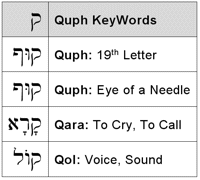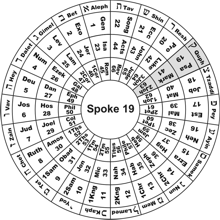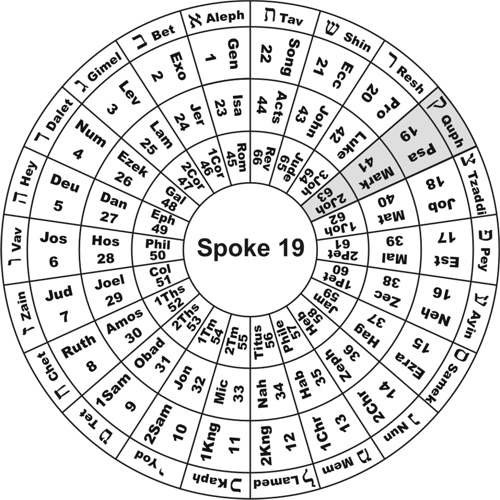A Cry of my Voice unto God
I cried with my whole heart; hear me, O LORD: I will keep thy statutes.
I cried unto thee; save me, and I shall keep thy testimonies.
Psalm 18:6 (Spoke 19, Cycle 1)
 The
name of the Nineteenth Letter denotes an Eye of a Needle. This coheres with its
form – The
name of the Nineteenth Letter denotes an Eye of a Needle. This coheres with its
form –  – in the ancient Hebrew script as a circle with a
line descending. It is still seen in the modern form – ק – and the corresponding Latin Q,
which looks like a line being threaded through the eye of a needle.
Quph is the most guttural of the Twenty-Two Letters. Its sound originates deep in
the back of the throat and is aptly described as the croaking of a crow’s caw.
This is the basis of the primary KeyWord qara (cry, call) which God used in many
of the Quph Alphabetic Verses: – in the ancient Hebrew script as a circle with a
line descending. It is still seen in the modern form – ק – and the corresponding Latin Q,
which looks like a line being threaded through the eye of a needle.
Quph is the most guttural of the Twenty-Two Letters. Its sound originates deep in
the back of the throat and is aptly described as the croaking of a crow’s caw.
This is the basis of the primary KeyWord qara (cry, call) which God used in many
of the Quph Alphabetic Verses:
- AV Ps 119:145 I cried (qara) with my whole heart; hear me, O LORD ...
- AV Ps 119:146 I cried (qara) unto thee; save me, and I shall keep thy testimonies.
- AV Lam 3:55 I called (qara) upon thy name, O LORD, out of the low dungeon.
- AV Lam 1:19 I called (qara) for my lovers, but they deceived me:
Qara is onomatopoetic; it sounds like what it describes. Words with a similar
meaning and sound appear in many languages, most notably the Greek krazw (kradzo, cry) which is
often used to translate qara in the Septuagint. It is prominent in Mark's Gospel on
the second Cycle. God used a closely related KeyWord, qol (voice), twice in
the Alphabetic Verses:
- AV Ps 119:149 Hear my voice (qol) according unto thy lovingkindness: O LORD, quicken me according to thy judgment.
- AV Lam 3:56 Thou hast heard my voice (qol): hide not thine ear at my breathing, at my cry.
The Hebrew qol (voice, call) is phonetically similar to the Greek kalew (kaleo, call)
and the corresponding English call. All these words and the ideas they represent are fundamental to
the nature of the Book of Psalms, the Bible's great Guide to Prayer that teaches us how to call unto God.
They appear together in many Psalms. Note that the quotes below are not Alphabetic Psalms.
We are looking here at characteristic verses of the Nineteenth Book itself to discern its dominant message:
- Psalm 3:4 I cried (qara) unto the LORD with my voice (qol), and
he heard me
- Psalm 27:7Hear, O LORD, when I cry (qara) with my voice (qol) ... and answer me.
- Psalm 55:16f PsalmAs for me, I will call (qara) upon God; and the LORD shall save me. Evening, and morning,
and at noon, will I pray, and cry aloud: and he shall hear my voice (qol).
- Psalm 141:1 LORD, I cry (qara) unto thee: make haste unto me; give ear unto my voice (qol),
when I cry (qara) unto thee.
These characteristic passages span the beginning, middle, and end of the Book of Psalms. They display the perfect integration
of the position and content of Psalms with the position and symbolic meaning of the Nineteenth Letter.
The triliteral root qara is extremely common. It occurs 737 times in the Old Testametn.
Though I have not detected any significant correlation between its raw distribution and
the structure of the Wheel, I have found a highly significant correlation if we search
for all first person occurrences of qara, as represented by the
phrases in the set {I cry, I cried, I will cry, I have cried, I call, I called,
I will call, I have called}. The graph below represents the distribution of all
verses containing these phrases:
The great theme of the Psalms can now be easily seen to be an objective property of Scripture.
Furthermore, this theme is integrated with the Hebrew Alphabet and the meaning of Quph as presented by God Himself in the
great alphabetic Psalm 119! Glory to God in the highest!
Next article: Drawing Near unto God
|



